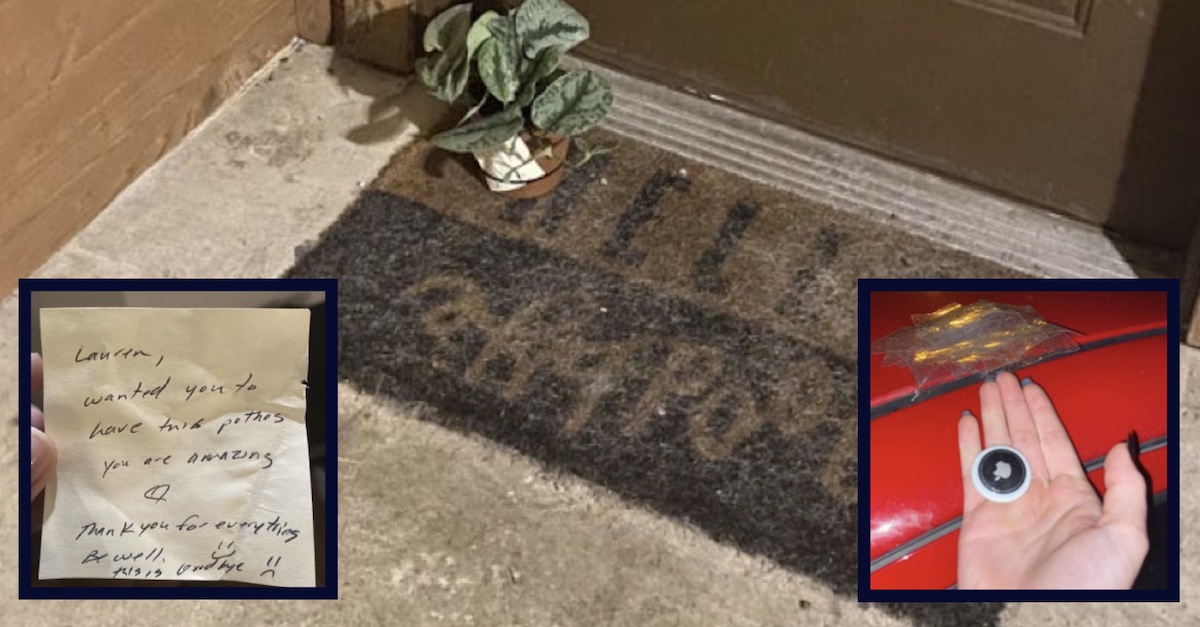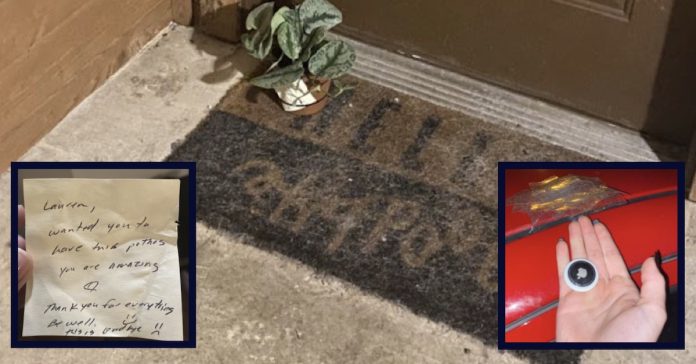
Court documents in Apple AirTag lawsuit include photos of a note and potted plant left at plaintiff Lauren Hughes’s doorstep.
A federal judge in California on Friday refused to dismiss negligence and product liability claims against Apple following allegations that AirTags have enabled stalkers and abusers to track victims at little cost to the criminal, sometimes with “devastating” and deadly consequences.
Last October, a class action complaint alleged that AirTags costing $29 have “become the weapon of choice of stalkers and abusers” in the years following the technology’s 2021 introduction, where Apple allegedly claimed to have “stalker proof” protections in place.
The plaintiffs, a collection of 38 individuals from California, the rest of the nation, and even Canada, claimed that AirTags have “consistently” facilitated stalking incidents and have, in some cases, been linked to murders. In an example of one chilling stalking incident, Lauren Hughes, the lead plaintiff, said it all started in August 2021 after she broke up with a man she dated for three months. The man, with the help of an AirTag, even left a potted plant and Post-it note at her doorstep in Texas, Hughes said, including photos as exhibits.
The focus of U.S. District Judge Vince Chhabria’s ruling, however, was largely on negligence and risk-benefit products liability claims brought by John Kirkman, Àine O’Neill, Hollye Humphreys, and claims brought by Roger Derick Hembd and Pamela Luan, each of them California residents.
In sum and summary, the claims brought by Kirkman, O’Neill, and Humphreys survived the motion to dismiss, but the Hembd and Luan claims were dismissed with leave to amend. In Hembd’s case, it wasn’t “sufficiently clear” that Apple’s “alleged breach was the cause of his injuries,” the judge said. In Luan’s case, her “allegations about the role that the AirTag played in the stalking are too vague,” Chhabria said.
The remaining plaintiffs’ claims were thrown out as “inadequately pled,” but importantly, as with Hembd and Luan, those plaintiffs were granted leave to amend.
From here, Chhabria explained why he ruled in some plaintiffs’ favor “even though” it was “a close question.”
“Those plaintiffs allege that, when they were stalked, the problems with the AirTag’s safety features were substantial, and that those safety defects caused their injuries. This ruling explains why those claims survive, even though it’s a close question. Apple may ultimately be right that California law did not require it to do more to diminish the ability of stalkers to use AirTags effectively, but that determination cannot be made at this early stag,” the judge said.
Chhabria walked said that John Kirkman’s claims could advance because, taking them as true, they “involve several of the purported defects” attributed to AirTags. Kirkman, who said that his estranged wife tracked him and his daughter down on Father’s Day weekend in 2022, alleged that design flaws in AirTags rendered him unable to tell that he was being stalked.
“He alleges that, despite trying to hide the location of his new home from his estranged wife, she managed to find the house and to terrorize him and his daughter. The complaint raises an inference that she was able to locate the home through the use of the AirTag, but it was not until the day after the incident that Kirkman first received a device notification,” the judge recounted. “Additionally, although both Kirkman and his daughter allege that they received device notifications, neither of them understood what the notifications meant, suggesting issues with the clarity of the notification text. Finally, it allegedly took several days for Kirkman to find the AirTag and remove it—had the sounds been louder or more distinctive, or had Kirkman had the ability to trigger the sound himself, he could have found it earlier.”
Ireland’s Àine O’Neill had dreams of a TV and movie career in Hollywood and moved there in 2021, but just a year later her life was turned completely upside down by a stalker who tracked her car’s movements, leading her to move back across the Atlantic Ocean, the judge continued:
Upon hearing a sound coming from her car, but not from inside the car, she concluded the AirTag was likely underneath the vehicle. Then she and her roommate both searched for the device, but neither could track it down. Although O’Neill could not locate the AirTag, her phone showed her everything the AirTag owner could see about her: “where she worked, where she parked her car, her home address, and everywhere she had been.” So she “texted with Apple,” and Apple “confirmed the existence of the AirTag but informed her that they were unable to disable [the] tag without physical possession.”
As in the Kirkman case, Chhabria found the design flaw argument sufficient to survive the motion to dismiss. He wrote that it was “clear that the screen notification did not arrive until after the stalker had discovered a great deal” about O’Neill, but that was not the only issue.
“Several asserted defects with the product—inadequate noise volume and insufficiently precise tracking—prevented O’Neill from ever finding the product to trace it back to her stalker,” the border said. “Another asserted defect—inability to disable the device remotely—prevented O’Neill from being free of the stalking while she still had her car.”
Similarly, Hollye Humphreys’ claims that her ex-husband hid an AirTag in her car “implicated” a “number of the asserted defects” in the product, Chhabria said.
“She alleges that she received device notifications for three days, but she ignored them because ‘she was unfamiliar with AirTags and did not know what the alert meant.’ On the third day, Humphreys received the notification while she was ‘off work,’ and ‘this time’ she ‘was able to activate the beeping sound,’ which she used to locate the device,” the judge went on. “And it was only through her online research that she discovered how to reveal the last four digits of the AirTag owner’s phone number and was able to confirm that it was her ex-husband. A number of the asserted defects are implicated in Humphreys’s story: the sound alerts did not begin on their own, and the sporadic and unclear notifications prolonged the stalking.”
Chhabria concluded by saying that “discovery may move forward immediately” in Kirkman, O’Neill and Humphreys’ cases and that if any remaining defendant wishes to amend their claims they must due so within 21 days of the order.
The plaintiffs and Apple, in a brief case management statement following the judge’s order, said they had “no updates” since the last such statement. They added, however, that both sides are “reviewing” the order on the motion to dismiss.
Read the order here.
Have a tip we should know? [email protected]

